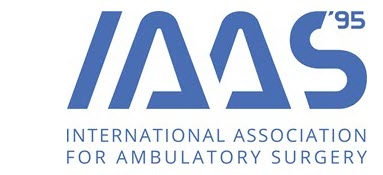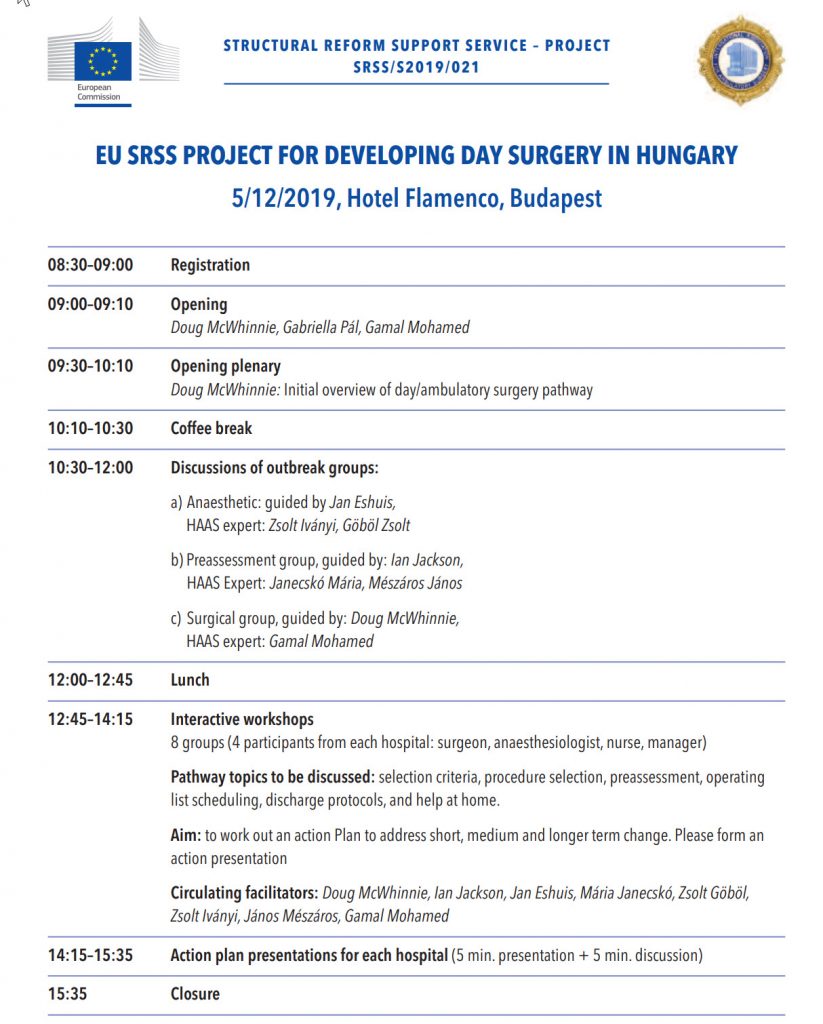Background
Each hospital was encouraged to bring a multidisciplinary team to the meeting made up of managers, surgeons, nurses and anaesthetists. The training was developed with 2 main strands.
- To provide education on the day surgery pathway
- To provide time for a workshop session where hospital teams would be facilitated in planning their next steps in developing day surgery.
The IAAS Team was headed by Professor McWhinnie supported by Dr Jan Eshuis and Dr Ian Jackson. They were supported by representatives from the Hungarian Association for Ambulatory Surgery led by Dr Gamal Mohamed.
Name | Hospital | Position |
Dr. Attila BODNÁR | Bajcsy-Zsilinszky Hospital | Director General |
Zsuzsanna KALECZ | Bajcsy-Zsilinszky Hospital | Director of Nursing |
Dr. Gábor PÓSFAI | Bajcsy-Zsilinszky Hospital | Head Physician |
Dr. Róbert RÉVAI | Bajcsy-Zsilinszky Hospital | Medical Director |
Dr. Olimpia SÓLYOM | Bajcsy-Zsilinszky Hospital | Deputy Medical Director Head of Ambulatory Care |
Dr. Tamás TÓTH | Bajcsy-Zsilinszky Hospital | Head Physician |
Dr. Ilona BOBEK | Dél-Pesti Central Hospital | Anesthesiologist Head Physician |
Dr. Péter MÜLLER | Dél-Pesti Central Hospital | Medical Director |
Dr. Gábor RADÓ | Dél-Pesti Central Hospital | Ophthalmologist Head Physician |
Dr. Zoltán KÖKÉNY | Jahn Ferenc Hospital | Medical Director |
Beatrix MOLNÁR | Jahn Ferenc Hospital | Nursing Specialist |
Dr. Bálint SZELE | Jahn Ferenc Hospital | Surgery Consultant |
Dr. Péter SZENTES | Jahn Ferenc Hospital | Anesthesiologist Consultant |
Judit GROMAN | National Institute of Oncology | Manager |
Dr. Dóra IHAROS | National Institute of Oncology | Anesthesiologist Head Physician |
Marianna INÁNCSI | National Institute of Oncology | Head Nurse |
Dr. András BENCSIK | Szent Imre Hospital | Head Physician, Deputy Head of Department |
Elza BURNYÓCZKY | Szent Imre Hospital | Head of Nursing Unit |
Miklosne NÉMETH | Szent Imre Hospital | Director of Nursing |
Dr. Bálint PORDÁNY | Szent Imre Hospital | Physician |
Ibolya CSERMÁK | Szent János Hospital | Head Nurse |
Dr. Zsolt DOMJÁN | Szent János Hospital | Urologist Head Physician |
Dr. Anikó LÁZÁR | Szent János Hospital | Anesthesiologist Head Physician |
Dr. Gábor SZÓCSKA | Szent János Hospital | Medical Director |
Hossem Zeen ABDELKAWY | Uzsoki Hospital | Nursing Specialist |
Dr. István MÉHÉSZ | Uzsoki Hospital | Anesthesiologist Consultant |
Dr. Balázs TÁCSIK | Uzsoki Hospital | Orthopedics and Trauma Care Specialist, Head Phyisican |
Dr. Ferenc TÓTH | Uzsoki Hospital | Medical Director |
Plenary session
The initial plenary session led by Professor McWhinnie was designed to provide an overview of the day surgery pathway and provide participants with an outline of how the day would run. The session was supported by simultaneous translation to ensure that those who were non-English speakers were not disadvantaged.
Breakout group session
The plan was to break the participants into 3 groups with a separate nursing group. However, following a request from the nurses via our HAAS colleagues, we modified this to 2 groups. Therefore, the groupings were
Group 1. Surgeons and managers
Group 2. Anaesthetists and nurses
Each group had a member of the international team leading discussion aided by an interpreter.
Group 1. The surgeons and managers were led by Professor McWhinnie.
Three topics for interactive discussion
- Procedures suitable for day surgery. The initial short presentation confirmed the limitations on suitable procedures and the value of baskets and directories of procedures with the requirement to regularly update or the listings become counterproductive. A short exercise was then conducted by asking each of the assembled group to write down the 7 most common procedures each performed and estimate which and what percentage of each could be performed on a day case basis. The interesting consensus was that the participants were rather conservative in their aspirations.
- Operating Room Scheduling. The overview explained the different ways and timing of running day surgery lists and the exercise task was to discuss 7 different patient profiles and decide the list order. Clearly there is no ‘correct’ answer but this topic provoked lively discussion and a realisation that planning day surgery cases requires a little more thought to ensure each patient is optimally scheduled to allow sufficient time for recovery. The need for good and safe preassessment was reiterated.
- Operating room turnaround time. The overview highlighted many of the reasons lists fail to commence on schedule and demonstrated through data that actual surgery only occurs in 60% of list time with anaesthetic time and turnaround time accommodating the other 40%. The group exercise here was to consider the most common reasons for each participants’ lists to fail to start on time and how this could be improved. The second question was to consider the reasons for turnaround delays in their hospitals and how this could be improved.
Group 2. The anaesthetists and nurses were led by Dr Jackson and Dr Eshuis.
Dr Jackson presented information about the importance of nursing staff throughout the day surgery pathway and led discussion with those present about issues around nurse involvement in the preoperative assessment process. Dr Eshuis then built on the protocols around patient selection and which patients are suitable for day surgery. There was good discussion during this session from both the anaesthetists and nurses present.
Interactive Session – workshop
This session was designed to challenge the representatives of each hospital to work as a group to design at least one short term goal and something they might achieve in the longer term to improve their day surgery pathway. They were provided with the pathway diagram and encouraged to look at one or two aspects of their current pathway.
To encourage the delegates, they were asked to provide 5-minute feedback from one team member to all the delegates at the end of the task. They were also informed that they would be presenting feedback on their progress on each task agreed at our next meeting in February. They were encouraged to contact us if they needed support during this time.
Feedback session
There were some common themes during the training day.
- The first was the current use of routine preoperative testing on patients including both blood tests and chest X-ray. These have long been abandoned in most countries and so we will provide some focus training on this at the next training day.
- Next was the lack of use of the WHO Checklist. Patient safety is fundamental to all surgical practice, our aim in day surgery is to act as leaders in promoting safer surgery. We have therefore challenged each unit to develop their use of this important process.
- Another topic was around successful anaesthesia in day surgery. The comment being that lack of identification of day cases led to inappropriate anaesthesia techniques being used. We believe that this type of anaesthesia should be used for all patients.
- Finally, the discharge process and enabling nursing staff to use criteria-based discharge process was a major topic. This facilitates the day surgery pathway.
Conclusion
The trainers were impressed by the commitment and keenness of everyone who took part. At the next meeting in February we will
- review progress on their plans
- provide advice on dealing with any blocks they have encountered
- cover the topics listed above
- challenge the teams with further planning on developing their day surgery pathway

